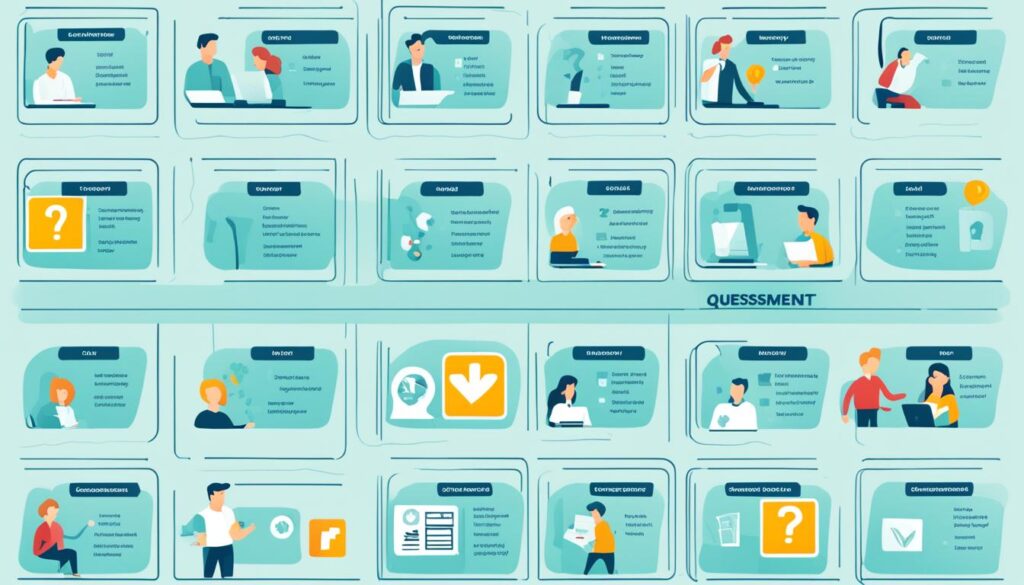
Have you ever felt stuck, unable to reach your goals despite your best efforts? I’ve been there. Years ago, I struggled to advance in my career, doubting my abilities at every turn. It wasn’t until I discovered the power of self-efficacy that everything changed. This belief in our capacity to succeed is the key to unlocking our true potential.
Self-efficacy isn’t just a fancy term – it’s the foundation of personal development. By building self-efficacy, we can overcome obstacles, embrace challenges, and achieve what once seemed impossible. This journey of enhancing self-efficacy is about more than just success; it’s about becoming the best version of ourselves.
In this article, we’ll explore practical strategies for boosting your self-efficacy. You’ll learn how to identify your current levels, set realistic goals, and leverage past successes. We’ll dive into the science behind self-efficacy and uncover how it shapes our behavior and personal growth.
Are you ready to unlock your potential? Let’s embark on this transformative journey together, exploring the power of self-efficacy and how it can revolutionize your life.
Key Takeaways
- Self-efficacy is crucial for personal growth and achievement
- Building self-efficacy can help overcome obstacles and reach goals
- Enhancing self-efficacy involves setting realistic goals and leveraging past successes
- Understanding the science behind self-efficacy aids in personal development
- Positive self-talk and a growth mindset contribute to improved self-efficacy
Understanding the Power of Self-Efficacy
Self-efficacy is key in our personal and work lives. It affects how we tackle challenges, set goals, and keep going when things get tough. Let’s dive into this important idea and see how it affects our growth and actions.
Defining Self-Efficacy
Self-efficacy is about believing in our ability to succeed in certain situations or complete tasks. It’s not about our actual skills but how we see our potential. This belief drives our motivation, effort, and resilience when we face challenges.

The Impact of Self-Efficacy on Personal Growth
Having high self-efficacy boosts our confidence and motivation for personal growth. People with strong self-belief set higher goals, work harder, and keep going even when things get tough. This cycle of believing in ourselves and taking action helps us improve and achieve more.
How Self-Efficacy Shapes Our Behavior
Self-efficacy affects our choices, efforts, and how we handle stress. Those with high self-belief see tough tasks as challenges to conquer, not threats to dodge. This mindset makes us more proactive and helps us solve problems better.
| Low Self-Efficacy | High Self-Efficacy |
|---|---|
| Avoids challenging tasks | Embraces challenges |
| Gives up easily | Persists through difficulties |
| Focuses on personal failings | Learns from setbacks |
| Loses confidence quickly | Maintains confidence in abilities |
Understanding self-efficacy is the first step to boosting it. By seeing its effects, we can find ways to improve our motivation and performance in life.
The Science Behind Self-Efficacy
Self-efficacy comes from psychology and neuroscience. It changes how our brain works and what we do. People with high self-efficacy use more brain areas for motivation and making decisions.

Albert Bandura, a psychologist, first used the term. He showed that our thoughts and actions are shaped by self-efficacy. Those with strong self-belief tackle challenges in a different way than those who doubt themselves.
Self-efficacy beliefs determine how people feel, think, motivate themselves and behave.
Studies back up these ideas. Brain scans show how self-efficacy changes our brain paths. This means boosting self-efficacy can change our behavior for the long term.
| Brain Region | Function | Impact of High Self-Efficacy |
|---|---|---|
| Prefrontal Cortex | Decision-making | Enhanced strategic thinking |
| Amygdala | Emotion processing | Reduced fear response |
| Hippocampus | Memory formation | Improved learning and retention |
Learning about self-efficacy shows its big impact on our lives. By using self-efficacy techniques, we can change our brains for success. This boosts our confidence in overcoming life’s hurdles.
Identifying Your Current Self-Efficacy Levels
Boosting self-efficacy begins with understanding where you are. Knowing your current levels helps you plan for success and resilience. Let’s look at how to check your beliefs and find areas to grow.
Self-Assessment Techniques
Try these methods to measure your self-efficacy:
- Rate your confidence in specific tasks from 1-10
- Keep a diary of your thoughts and feelings about challenges
- Ask trusted friends for honest feedback on your abilities

Recognizing Limiting Beliefs
Limiting beliefs can hold you back. Watch out for thoughts like “I’m not good enough” or “I’ll never succeed.” These thoughts show where you need to boost your self-efficacy.
Pinpointing Areas for Improvement
After checking your self-efficacy, focus on what needs work. Maybe you’re not confident in public speaking or struggle with managing time. Spotting these areas is key to improving your self-efficacy and resilience.
“Self-awareness is the first step to self-improvement.”
Self-efficacy can change. By knowing where you are, you’re starting to reach your full potential. This leads to more success in life.
Setting Realistic Goals to Build Self-Efficacy
Setting realistic goals boosts your self-efficacy in achieving your goals. Break down big dreams into smaller steps for a clear path to success. This method increases your confidence and helps in professional growth.
Start with SMART goals: Specific, Measurable, Achievable, Relevant, and Time-bound. This method makes your goals both challenging and reachable. For instance, instead of “I want to improve my skills,” aim for “I will finish an online course in project management in three months.”
It’s important to break your goals into smaller tasks. This approach lets you win often, boosting your confidence. Each task you complete helps build your self-efficacy in reaching your goals.
“The man who moves a mountain begins by carrying away small stones.” – Confucius
The path to growing your self-efficacy in your career is continuous. Celebrate your small wins. These successes prove your skills and boost your confidence to face bigger challenges. By setting and reaching realistic goals, you’re not just doing tasks. You’re building a stronger, more confident you.
Leveraging Past Successes to Enhance Self-Efficacy
Building self-efficacy is key to personal growth. Reflecting on past wins boosts our confidence and prepares us for future challenges. This section shares ways to use your successes to boost self-efficacy.
Reflecting on Previous Achievements
Think back to your past wins, big or small. This helps strengthen your belief in yourself. Make a list of your top five achievements and the skills you used to get them.
Extracting Lessons from Challenges Overcome
Every challenge you’ve beaten teaches you something. Look back to see what strengths and strategies helped you succeed. This reflection is crucial for growing your self-efficacy and personal growth.
Creating a Success Journal
A success journal is great for tracking your progress and boosting self-efficacy. Write down your daily wins, no matter how small, and check them often. This keeps you positive and confident in your abilities.
| Success Journal Components | Benefits |
|---|---|
| Daily accomplishments | Builds momentum and motivation |
| Challenges overcome | Reinforces problem-solving skills |
| Positive feedback received | Boosts self-esteem and confidence |
| Goals achieved | Demonstrates progress and growth |
Using these methods regularly will make you more confident in personal development. Remember, every success, big or small, helps you grow and build confidence.
The Role of Positive Self-Talk in Boosting Self-Efficacy
Your inner thoughts shape what you believe and do. Positive self-talk is a key way to boost your self-confidence and motivation. By changing how you talk to yourself, you can gain more confidence and reach your goals.
Start by catching negative thoughts. When you feel doubt, stop and change it. Instead of saying “I can’t do this,” say “This is tough, but I’m getting better.” This small change can greatly improve your outlook.
Make affirmations a daily habit. Pick phrases that feel true to you and say them often. Here are some examples:
- “I am capable of overcoming obstacles.”
- “I grow stronger with each challenge I face.”
- “My efforts lead to success.”
Visualization is also a great way to boost your self-confidence. Imagine yourself achieving your goals. This mental practice can increase your confidence and prepare you for real situations.
“The way you talk to yourself matters. Positive self-talk can fuel your success and help you overcome self-doubt.”
Changing your self-talk takes time and effort. Be kind to yourself as you work on this new habit. With steady practice, you’ll see better self-confidence and motivation.
Developing a Growth Mindset for Improved Self-Efficacy
A growth mindset is key to boosting self-efficacy and resilience. It helps you see challenges as chances to grow and learn.
Embracing Challenges as Opportunities
When you hit a roadblock, see it as a way to get better. This mindset helps you grow in school and life. Break down big tasks into smaller steps to build your confidence.
Cultivating Resilience in the Face of Setbacks
Being resilient keeps your self-efficacy strong when things don’t go well. Bounce back from failures by focusing on what you can control and learning from each experience.
“The only way to learn strong self-efficacy is through overcoming obstacles.”
Reframing Failures as Learning Experiences
Don’t see failures as the end. They’re actually valuable lessons. This mindset is crucial for boosting self-efficacy. Ask yourself: “What can I learn from this?” after each failure to get stronger.
| Fixed Mindset | Growth Mindset |
|---|---|
| Avoids challenges | Embraces challenges |
| Gives up easily | Persists in face of setbacks |
| Sees effort as fruitless | Views effort as path to mastery |
| Ignores useful feedback | Learns from criticism |
By adopting a growth mindset, you lay a solid base for boosting self-efficacy. This mindset builds resilience and helps you tackle obstacles, leading to more success in life and work.
Surrounding Yourself with Supportive Influences
Your environment greatly affects your self-efficacy. Being around positive people can really help you grow. Try to hang out with friends who believe in you and support you.
Having a mentor can change the game for your career. Look for someone who has reached your goals. Their advice can boost your self-confidence by showing you what you can do. They can share what worked for them.
Building a network of people with similar goals is also key. Join groups or clubs that match your interests. You’ll meet others aiming for the same things. Sharing ideas and stories can inspire and motivate you.
Self-efficacy in your career comes from the people around you. Choose your friends and mentors carefully.
Be around those who encourage you to do better. They’ll help you believe in yourself and achieve your goals.


